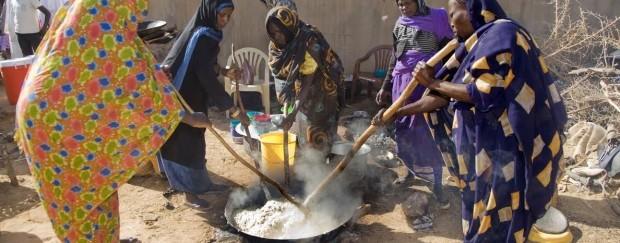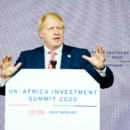Making Democracy Soup in Africa: how one bad ingredient can spoil the lot – By Victoria Crawford


Democracy is like soup: While basic ingredients are needed, there is no right or wrong recipe to follow.
In May 2012, the late Ethiopian PM Meles Zenawi is holding court on a panel at the World Economic Forum on Africa, held in the Ethiopian capital, Addis Ababa. His mixture of wit, intelligence and credentials as guerrilla leader turned president helps him to effortlessly dominate the discussion. But Meles, despite his habitual presence amongst the great and the good at global fora, was by no means a natural democrat.
During the discussion Meles, in playful style, asserted that “There is no direct relationship between democracy and growth…but the case for democracy can stand on its own”.
As citizens of a much lauded democracy, this is uncomfortable. For decades the West has been pushing an agenda in Africa based on good governance, accountability and, more recently, transparency. Look to other parts of the world however and we see that some of the countries that have made the greatest progress in lifting their citizens out of poverty have done so without such luxuries.
China pulled 680m people out of misery between 1981-2010, reducing its extreme-poverty rate from 84% in 1980 to 10% now and is credited for three quarters of the progress made towards the Millennium Development Goals (MDGs), while Vietnam managed to meet the first MDG of halving poverty over the period 1990-2015 more than a decade in advance, a quite remarkable feat. Neither pays much heed to democracy.
There are similar stories in Africa; Ethiopia and Rwanda are given much credit for ensuring people have enough to eat, malaria is treated and girls go to school, but press freedom and the right to organise against the current political order (without unfortunate personal consequences) remain elusive.
This got us thinking: if democracy is not necessary for the achievement of economic growth and development, then perhaps we need to review our thinking on how we promote it in “˜developing’ countries. What role does democracy have to play? And what does this mean for us, the international community?
To investigate this, the Africa All Party Parliamentary Group (APPG) held 4 expert-led thematic roundtables, met 3 committees of African Parliamentarians and visited 2 African countries, as well as conducting a call for written evidence and drawing on our experiences in the continent more broadly.
Working with a group of parliamentarians, the suggestion that democracy isn’t necessarily the answer was always going to be a hard sell. As James Duddridge MP, Chair of the Africa APPG says, “as politicians we are convinced that democracy (however you define it) is part of what helps a country develop, part of the “˜Golden Thread'”.
But pinning down a “˜link’ between democracy and development proved to be a more difficult task that anticipated. The more you try to establish what democracy actually is, to give it a definition, the more the concept splinters and expands. It is even harder to define what particular qualities inherent in “˜democracy’ actually contribute to the citizens of a country experiencing “˜development’. We could only go as far as saying that while some autocracies have been successful at bringing about development for their citizens, others have been disastrous, and while some democracies haven’t been successful, others have.
What is clear however is that there has been a fundamental shift in governance in Africa; where only one in five sub-Saharan African countries were “˜democratic’ (they held elections and multiple parties won seats) at the end of the Cold War in 1991, over 80 percent are “˜democratic’ today. However, our discussions with African parliamentarians about the state of democracy in their own countries suggest that the continent’s young democracies are often weak and partial: even MPs from Botswana, held up as a model of democracy in Africa, pointed out that a single party has been in power since Independence. But, despite its flaws, this wave of democracy is unlikely to reverse and what is now critical is that these young democracies remain or become political systems that deliver.
There is no single prescription for this. Our visits to Ethiopia and Sierra Leone showed two very different models of democracy, each of which has its own strengths and weaknesses. In this report we call this “˜Democracy Soup’. Various ingredients are required: a democratically elected government, a representative parliament, an independent judiciary, a well-motivated and trained police force, a non-political and professional army, an honest and hard-working public service, an independent and responsible media, and an active civil society. But the soup can vary between different countries. While basic ingredients are needed, there is no right or wrong recipe to follow.
Our visit to Sierra Leone highlighted that a single “˜off’ ingredient can spoil the soup. Here we met a host of committed organisations and individuals working to address corruption, specifically in the Anti-Corruption Commission and the Sierra Leone Audit Service. However, weak links in the system were letting them down. In particular the judiciary was criticised for not prosecuting individuals accused of corruption and handing out lenient sentences to those it did prosecute. This has the effect that Sierra Leoneans weren’t reaping the rewards of the commendable work done to tackle corruption elsewhere.
Our experiences in other countries paint a similar picture: that democracy in Africa is being undermined in cases where the executive branch of Government is considerably more powerful than Parliament or the judiciary. As Parliamentarians, Members of the Africa APPG were particularly concerned about a number of factors that appear to be holding back African Parliaments from playing their role as the only actors with a democratic mandate to hold government to account.
In many countries in Africa there is a strong perception that the prime role of an MP is to provide direct material benefits to his or her constituents, rather than to influence policy decisions. This poses a major constraint for MPs in carrying out their jobs. In some places this is institutionalised through Constituency Development Funds, for example the Kenyan Constituencies Development Fund Act (2013) gives MPs responsibility for 2.5% of the national budget to be spent on projects in their constituencies.
In other countries MPs are expected to source resources themselves to help their constituents, for example paying for medical bills, school fees or funerals. While visiting the Parliament in Sierra Leone, we were particularly concerned to hear MPs explain that they avoid returning to their constituencies because of the queues of constituents who would wait outside their houses for financial assistance, and speak quite openly about the need to undertake “consultancies” to supplement their income as they are expected to pay out several times their salary to their constituents.
Some African Parliaments have a primarily advisory role, limiting the extent to which they are able to hold Government to account. For example in Ethiopia, it is only recently that Parliamentarians have begun to summon and question Ministers. Ugandan Parliamentarians emphasised their limited influence impacted on accountability in their country.
Parliaments may also be disempowered if other civil society groups are invited to the table in their place, for example the Parliamentarians we met in Sierra Leone felt they were by-passed by international NGOs.
Parliaments are held back where debate between political parties fails to provide an effective “˜battle of ideas’ and a lack of party manifestos means citizens are less well positioned to see where politicians have fallen short on promises. Our visit to Ethiopia highlighted that while the Ethiopian Government is keen to encourage policy debate, most of this is within the ruling Ethiopian People’s Revolutionary Democratic Front (EPRDF), more limited than debate that might occur between political parties. The Opposition voices we met provided little in the way of an alternative set of policy prescriptions and came across as disjointed and disengaged; some of the opposition figures attending a reception organised as part of our visit hadn’t even previously met each other!
More broadly, MPs in Africa are often elected on the basis of factors other than policy ideas – ethnicity or the personalities of the individuals involved – so party manifestos play a lesser role.
If we expect democracy to deliver for its citizens, the whole governance system needs to work, and that means a balance of power between the executive, legislative and judicial branches of Government. But we have seen how a range of barriers, combined with the limited capacity of many African Parliaments and of their crucial Public Accounts Committees, can limit Parliament’s ability to hold the executive to account.
Yet at the same time international support seems focused largely on the executive or at the grassroots, leaving relatively little time or effort for parliaments and the “missing middle”. Diplomats talk to Ministers and aid passes through the machinery of government departments, while grassroots civil society groups are supported to hold Government to account.
A re-think about where we put our support might make for a thicker and more nourishing broth.
Victoria Crawford is Research Coordinator, Africa APPG. You can access the report here







You talk about democracy, and yet this site has a special page on ‘rethinking Zimbabwe’? Hypocrites!
This is ill informed, liberal codswallop. Has Victoria spent more than two weeks in Africa, not in five star hotels, ever? For those of that live with the consequences of our friends disappearing (Ethiopia) our colleagues being tortured and kidnapped (Tanzania, journalists) and being systematically pressured to keep our heads down (Rwanda) this report actually disgusts me. Poor old Sierra Leone MPs, they are obliged to do what any rich man/woman is required to do, which is, in the absence of a working tax system, the social welfare system is effectively personalised. What is the per diem of the MP’s I wonder? Seriously Victoria- please call me. I’m a respected journo, educated in UK, am just about to complete my PhD. I’ve spent a long time living in Africa, there are a whole raft of things you need to be put right on. Just as fiddling expenses in UK, lying about moats or relatives working for you in UK is never going to wash as an MP, there are certain aspects of parliament in Tanzania and Ethiopia that just aren’t ok. And this constant fudging and double speak actually reveals that either the British gov has no idea what they are doing, or more likely, they are hiding behind a meaningless smoke screen of ‘diplomacy’ where language loses any real direction.
Also it seems the citizens, the subjects are bypassing the state. There are plenty of alternatives to parliaments; in fact some of the most interesting work academically coming out of East and Sub Saharan Africa is looking at sites of resistance: art, songs, culture etc, and asking why this disconnect between the elite middle classes of East?South Africa, and the majority of the populations, is so great.
I am not saying parliamentary democracy in South Africa, Tanzania or Ethiopia is bad- I am saying that just as in the UK, it has no crediblity. And is not a decision-making, or leader-making machine.